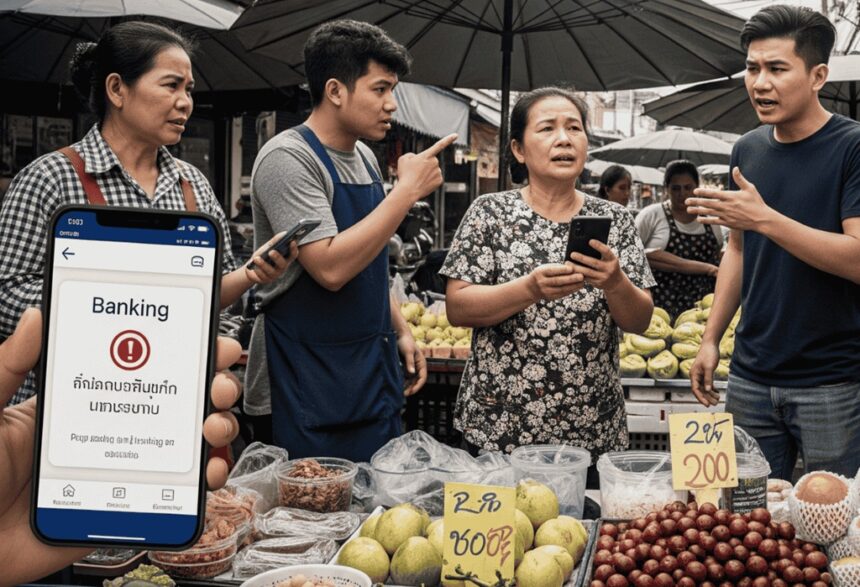BANGKOK – Thailand banks have frozen more than three million accounts as part of a strong push to stop a wave of online scams. This move, which started in joint action by the Bank of Thailand (BoT), the Cyber Crime Investigation Bureau (CCIB), and the Ministry of Digital Economy and Society (DES), has also caught many innocent online sellers and small business owners.
The focus is on stopping “mule accounts” set up to move stolen money, but the crackdown has disrupted businesses that depend on digital payments. Banks are now working quickly to unlock affected accounts and help those whose funds are stuck.
Why the Banks Froze Accounts
The freezing of accounts started in August 2025 after a jump in online fraud that has cost Thais an estimated 6 billion baht (about $180 million USD) recently. Criminals moved beyond using only mule accounts.
They now buy products from unsuspecting online sellers and resell them, which makes the money trail harder to follow. Commissioner Pol Lt Gen Trairong Phiwpan of the CCIB explained that these scams trap innocent people in fraud investigations. He shared an example where fraudsters pushed 100,000 baht into a child’s account to move money around.
Automated systems are now flagging and freezing the accounts of online sellers, especially those with many transactions or frequent transfers. Daranee Saeju, Assistant Governor for Financial Consumer Protection at the BoT, said accounts receiving payments from flagged mule accounts get locked to help recover stolen cash.
She stressed that they only freeze accounts tied to suspicious transactions to return funds to victims. However, the scale of these checks, matched with advanced tracking tools, has hit regular online sellers and individuals. Many use QR codes and e-wallets for business and have seen payments stop or customers switch to cash, which has made things worse for their working capital.
This action also supports Thailand’s compliance with global anti-money laundering (AML) and “Know Your Customer” (KYC) rules. Events like the May 2025 arrests of four bank staff in Pattaya for opening accounts for foreigners on tourist visas (which were then used in scams involving over 100 million baht) pushed for stricter controls.
Thailand banks are now using stronger ID checks and biometric scans, especially for foreigners. Accounts not linked to long-term visas or with missing KYC data have been suspended, piling pressure on online sellers, many of whom are legal residents or citizens.
Thailand Banks Move to Tackle the Issue
Banks are trying to limit the fallout by speeding up processes to unfreeze accounts for those who did nothing wrong. Following emergency talks on 14 September 2025, the Bank of Thailand, Thai Bankers’ Association, CCIB, and Anti-Money Laundering Office (AMLO) agreed that banks should unfreeze accounts of cleared individuals within four hours to one working day, much faster than the previous wait of three to seven days.
Banks now keep only the amount suspected as linked to scam activity locked, rather than blocking the entire account. Daranee Saeju pointed out that this helps people keep access to money that is not part of any investigation.
When an account is frozen or released, customers are told by SMS or app notification, and banks must explain the situation clearly. The move comes after a technical error on 1 September led many to see their balances display as negative or out of date.
The DES has set up a “war room” to handle the surge in calls from affected bank customers. BoT, CCIB, and the banks are working together to review frozen accounts, using transaction data to separate innocent users from those linked to scams.
DES permanent secretary Wisit Wisitsora-at said these holds are only temporary. Once investigations are complete, cleared accounts are unlocked at once. Those hit by freezes can reach out to their Thailand banks with their name, ID, account, and bank details to speed things up. Most cases should be sorted in under half a day.
For small business owners, the war room is creating a checklist to help prove that their business is genuine. Sellers can use transaction histories or business records to back up their case. The BoT is also working on a new system to check accounts automatically against the AMLO’s mule account database, which they hope will be live within a week and prevent more accounts from being hit by mistake.
Trouble and Backlash
Still, the situation remains tricky. Only 10 percent of reviewed accounts have been unlocked, as many cases need long investigations due to tangled financial trails. Small sellers have been hit hard, with many forced to stop trading or report heavy losses while funds are out of reach. Social media, with posts like one from YOZZO calling the system “broken,” has highlighted the widespread impact on normal people.
Critics worry that these steps could hurt Thailand’s fast-growing online shopping scene by making digital payments less reliable. Senator Pinyapat Sansaneeyacheewin voiced concern about public trust in banks.
The tougher rules have also affected foreigners in areas like Phuket and Pattaya, who often face stricter ID checks and need long-term visas. This has led some embassies to suggest alternative ways to pay. Some, including Bitcoin advocate Sasha Hodder, argue that digital currencies could reduce the risk of frozen funds, but local rules mean crypto cannot be used for payments in Thailand.
The BoT and banks are trying to keep the balance between fighting fraud and making it easy for customers to access their money. New strategies include smarter fraud detection and closer checks on customer activity to avoid freezing the accounts of genuine users.
People are reminded to update their KYC details, keep good transaction records, and get in touch with their Thailand banks or use hotlines (1213, 1441, or 095-425-7478) if they need help.
The crackdown has caused serious problems for many, but officials believe strong action is needed to stop ongoing scams. For those running online businesses, the promise of quicker and better help brings some relief, but trust in banks is still being rebuilt.
Wisit Wisitsora-at has urged everyone not to panic, saying the goal is to protect both the financial system and the people who depend on it.














